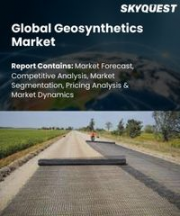
|
시장보고서
상품코드
1678541
미국의 지오텍스타일 시장 규모, 점유율, 동향 분석 : 재료별, 제품별, 용도별, 부문별 예측(2025-2030년)U.S. Geotextile Market Size, Share & Trends Analysis Report By Material (Natural, Synthetic), By Product (Woven, Non-woven), By Application (Erosion Control, Drainage System), And Segment Forecasts, 2025 - 2030 |
||||||
미국 지오텍스타일 시장의 성장과 동향
Grand View Research, Inc.의 최신 리포트에 따르면 미국의 지오텍스타일 시장 규모는 2030년까지 12억 9,000만 달러에 달할 전망입니다.
이 시장은 2025-2030년 연평균 4.1%의 성장률을 보일 것으로 예상됩니다. 지오텍스타일은 다른 재료에 비해 비용 효율적이고 수명이 길며, 토양 침식에 대한 환경적 관심이 증가함에 따라 미국내 제품 수요가 증가할 것으로 예상됩니다. 규제기관의 노력과 촉진 정책은 지오텍스타일이 제공하는 이점에 대한 인식을 높이는 데 도움이 되고 있습니다.
지오텍스타일의 주요 용도에는 새로운 도로 건설 및 배수 시스템 등이 있습니다. 미국은 앞서 언급한 용도에 대한 보급이 진행되고 있으며, 제품 수요에 크게 기여할 것으로 예상됩니다. 또한 2021년 미국 정부는 인프라 투자 고용법(IIJA)에 따라 2022-2026년 5,500억 달러 이상을 투자할 것이라고 발표했습니다. 많은 금액이 인프라 투자에 투입될 것으로 예상되며, 고속도로 및 교량, 해양, 파이프라인, 공항, 철도 건설에 대규모 투자가 이루어질 가능성이 높습니다.
정부 구상 및 기타 규제기관의 지원을 받는 혁신도 시장 성장에 긍정적으로 기여하는 주요 요인 중 하나입니다. 정부 기관의 적극적인 참여 요인으로는 제조 및 응용을 위한 일자리 창출, 현재 환경 조건의 개선 등을 들 수 있습니다.
지오텍스타일은 용도에 따라 인장강도, 개구부 크기 등 일정한 규격으로 제조됩니다. 미국에서는 미국 도로교통행정관협회(AASHTO)와 같은 규제기관이 제조 기준을 정하고 있으며, 여기에는 적용 지역, 지역별 용도, 수량 등 일반적인 요구사항에 대응하기 위한 필수 시험이 포함되어 있습니다.
이러한 국가들과의 지오텍스타일 거래는 각 국가가 무역을 위해 정한 자체 표준을 가지고 있으므로 쉽게 이루어집니다. 또한 미국 시장에서 거래되는 지오텍스타일은 이상적인 지역적, 기후적 조건으로 인해 더 높은 품질을 얻을 수 있습니다. 그 결과, 미국에서 기타 지역으로의 제품 수출도 높은 품질로 인해 증가하고 있습니다. 이는 미국 시장 성장을 더욱 촉진할 것으로 예상됩니다.
토목섬유는 나일론, 폴리에스테르, 폴리에틸렌 등 합성섬유로 만들어집니다. 앞서 언급한 합성섬유는 대부분 석유를 주원료로 합니다. 원유 과잉 채굴은 매장량 고갈과 가격 상승을 초래하여 석유를 원료로 하는 제품에서 다른 대체품으로 전환을 촉진하고 있습니다. 합성 섬유의 생산은(원료의 획득에서 섬유의 제조에 이르는) 변환 및 제조 공정에서 탄소 배출 측면에서 환경에 부정적인 영향을 미칩니다.
미국 토목섬유 시장 : 분석 개요
- 재료별로 시장은 천연 재료와 합성 재료로 분류되며, 2024년 매출 점유율은 합성 재료가 91.8%로 가장 큰 부문을 차지하고 있습니다. 이러한 성장은 높은 내구성, 강도, 내습성에 기인합니다. 또한 천연 소재에 비해 취급 및 제조가 용이하고 가격도 저렴합니다.
- 부직포 지오텍스타일은 2024년 62.5%의 가장 큰 매출 점유율을 차지하며 시장을 주도했습니다. 부직포 부문은 흡수성, 발수성, 발수성, 기계적 강도와 같은 고유한 제품 특성으로 인해 2024년 미국 토목섬유 시장의 주요 점유율(수량 기준)을 차지했습니다.
- 이 제품은 천공 저항과 탄성을 높이는 추가 보호층 역할을 하므로 라이닝 시스템 용도에서 수요가 증가하고 있습니다. 지오텍스타일은 폐기물 매립지, 운하, 댐, 광산 등의 라이닝 시스템에 사용됩니다. 운하는 물의 흐름에 저항하고 누수로 인한 피해를 줄이기 위해 불투수층으로 라이닝해야 합니다.
- 지오텍스타일의 대체재로는 지오넷, 지오그리드 등 다양한 지오신세틱이 있으므로 대체재의 위협은 중간 정도라고 할 수 있습니다. 이들 제품은 지오텍스타일과 동일한 기능을 수행합니다. 반면, 지오텍스타일은 저가의 원료로 제조되고 제조 절차가 매우 간단하므로 가격이 저렴합니다.
목차
제1장 분석 방법·범위
제2장 개요
제3장 미국의 지오텍스타일 시장 : 변동 요인·동향·범위
- 미국의 지오텍스타일 시장 전망
- 업계의 밸류체인 분석
- 용도 개요
- 평균 가격 동향 분석
- 수급 갭 분석(2024년)
- 규제 프레임워크
- 정책과 장려책 플랜
- 표준과 컴플라이언스
- 규제 영향 분석
- 시장 역학
- 시장 성장 촉진요인 분석
- 시장 성장 억제요인 분석
- 업계의 과제
- Porter's Five Forces 분석
- 공급업체의 힘
- 구매자의 힘
- 대체의 위협
- 신규 참여로부터의 위협
- 경쟁 기업 간 경쟁 관계
- PESTEL 분석
- 정치적 요인
- 경제적 요인
- 사회적 요인
- 기술적 요인
- 환경적 요인
- 법적 요인
제4장 미국의 지오텍스타일 시장 : 재료별 전망·추정·예측
- 미국의 지오텍스타일 시장 : 변동 분석, 재료별(2024년·2030년)
- 천연
- 합성
제5장 미국의 지오텍스타일 시장 : 제품별 전망·추정·예측
- 미국의 지오텍스타일 시장 : 변동 분석, 제품별(2024년·2030년)
- 부직포
- 직포
- 니트
제6장 미국의 지오텍스타일 시장 : 용도별 전망·추정·예측
- 미국의 지오텍스타일 시장 : 변동 분석, 용도별(2024년·2030년)
- 사방
- 강화
- 배수 시스템
- 라이닝 시스템
- 아스팔트 오버레이
- 분리·안정화
- 실트 펜스
제7장 경쟁 구도
- 최신 동향과 영향 분석 : 주요 시장 참여 기업별
- 벤더 구도
- 기업 분류
- 주요 유통업체·채널 파트너 리스트
- 잠재적 고객/최종사용자 리스트
- 경쟁 역학
- 경쟁 벤치마킹
- 전략 지도제작
- 히트맵 분석
- 기업 개요/상장기업
- GSE Environmental
- TYPAR Geosynthetics
- Belton Industries
- AGRU AMERICA, INC.
- SKAPS Industries
- Propex Operating Company, LLC
- HUESKER International
- Terrafix Geosynthetics
U.S. Geotextile Market Growth & Trends:
The U.S. geotextile market size is expected to reach USD 1.29 billion by 2030, according to a new report by Grand View Research, Inc. The market is expected to expand at a CAGR of 4.1% from 2025 to 2030. The cost-effectiveness and longer lifespan of geotextiles compared to other materials and the growing environmental concerns regarding soil erosion are projected to drive the product demand in the U.S. Initiatives by regulatory bodies and promotional policies have aided in increasing the awareness related to the benefits offered by geotextiles.
The major applications of geotextiles include the construction of new roads and drainage systems. The U.S. is expected to contribute majorly to the product demand owing to their increasing penetration in the aforementioned applications. In addition, in 2021, under the Infrastructure Investment and Jobs Act (IIJA), the U.S. government announced over USD 550.00 billion to be invested from 2022 to 2026. A large investment amount is expected to go into infrastructure investment, where major investments are likely to be made in the construction of highways & bridges, marine, pipeline, airports, and railways.
Innovation backed by government initiatives and other regulatory bodies is another major factor that is positively contributing to market growth. A few factors responsible for the active participation of government bodies include the creation of employment for manufacturing & application and the improvement of current environmental conditions.
Geotextiles are manufactured with certain specifications such as tensile strength and opening size, depending on their application area. In the U.S., regulatory agencies, such as the American Association of State Highway and Transport Officials (AASHTO), have defined manufacturing standards, which include mandatory tests to address general requirements such as application area, application by geography, and quantity.
Trading geotextiles with such countries becomes easier as each country has its own set of defined standards for trade. In addition, geotextiles traded from the U.S. market yield higher quality results owing to the ideal geographical and climatic conditions. As a result, the export of products from the U.S. to other regions has also increased due to their high quality. This is expected to further propel the market growth in the country.
Geotextile is made of synthetic fibers such as nylon, polyester, or polyethylene. Petroleum is a major raw material for most of the aforementioned synthetic fibers. Excessive extraction of crude oil has resulted in the depletion of reserves and an increase in prices, thus encouraging a shift from petroleum-based products to other alternatives. The production of synthetic fibers has a negative impact on the environment, in terms of carbon emissions, during conversion and manufacturing processes (starting from raw material acquisition to textile fabrication).
U.S. Geotextile Market Report Highlights:
- Based on material, the market is divided into natural and synthetic. Synthetic material accounted for the largest segment with 91.8% revenue share in 2024. This growth is attributed to its high durability, strength, and moisture-resistant properties. Furthermore, they are easier to handle & manufacture and are cheaper than their natural counterparts.
- Non-woven geotextiles led the market and accounted for the largest revenue share of 62.5% in 2024. Non-woven segment dominated the U.S. geotextile market accounting for a major share of the total market, in terms of volume, in 2024, owing to unique product properties such as absorbency, liquid repellency, and mechanical strength.
- The demand for product is increasing in lining system applications as it acts as an additional protective layer that makes it puncture resistant and more resilient. Geotextiles are used in waste landfills, canals, dams, and mining for lining systems. To resist water flow and reduce damage due to leakage, the canals must be lined with an impermeable layer.
- The threat of substitution is considered moderate owing to the presence of Geotextile substitutes include a variety of geosynthetics such as geonets and geogrids. These products perform the same functions as geotextiles. Geotextiles, on the other hand, are less expensive since they are manufactured with low-cost raw ingredients and very easy manufacturing procedures.
Table of Content
Chapter 1. Methodology and Scope
- 1.1. Market Segmentation & Scope
- 1.2. Market Definition
- 1.3. Information Procurement
- 1.3.1. Purchased Database
- 1.3.2. GVR's Internal Database
- 1.3.3. Secondary Sources & Third-Party Perspectives
- 1.3.4. Primary Research
- 1.4. Information Analysis
- 1.4.1. Data Analysis Models
- 1.5. Market Formulation & Data Visualization
- 1.6. Data Validation & Publishing
Chapter 2. Executive Summary
- 2.1. Market Insights
- 2.2. Segmental Outlook
- 2.3. Competitive Outlook
Chapter 3. U.S. Geotextile Market Variables, Trends & Scope
- 3.1. U.S. Geotextile Market Outlook
- 3.2. Industry Value Chain Analysis
- 3.3. Application Overview
- 3.4. Average Price Trend Analysis
- 3.5. Supply-Demand Gap Analysis, 2024
- 3.6. Regulatory Framework
- 3.6.1. Policies and Incentive Plans
- 3.6.2. Standards and Compliances
- 3.6.3. Regulatory Impact Analysis
- 3.7. Market Dynamics
- 3.7.1. Market Driver Analysis
- 3.7.2. Market Restraint Analysis
- 3.7.3. Industry Challenges
- 3.8. Porter's Five Forces Analysis
- 3.8.1. Supplier Power
- 3.8.2. Buyer Power
- 3.8.3. Substitution Threat
- 3.8.4. Threat from New Entrant
- 3.8.5. Competitive Rivalry
- 3.9. PESTEL Analysis
- 3.9.1. Political Landscape
- 3.9.2. Economic Landscape
- 3.9.3. Social Landscape
- 3.9.4. Technological Landscape
- 3.9.5. Environmental Landscape
- 3.9.6. Legal Landscape
Chapter 4. U.S. Geotextile Market: Material Outlook Estimates & Forecasts
- 4.1. U.S. Geotextile Market: Material Movement Analysis, 2024 & 2030
- 4.1.1. Natural
- 4.1.1.1. Market Estimates and Forecast, 2018 - 2030 (Million Square Meters) (USD Million)
- 4.1.2. Synthetic
- 4.1.2.1. Market Estimates and Forecast, 2018 - 2030 (Million Square Meters) (USD Million)
- 4.1.1. Natural
Chapter 5. U.S. Geotextile Market: Product Outlook Estimates & Forecasts
- 5.1. U.S. Geotextile Market: Product Movement Analysis, 2024 & 2030
- 5.1.1. Non-Woven
- 5.1.1.1. Market Estimates and Forecast, 2018 - 2030 (Million Square Meters) (USD Million)
- 5.1.2. Woven
- 5.1.2.1. Market Estimates and Forecast, 2018 - 2030 (Million Square Meters) (USD Million)
- 5.1.3. Knitted
- 5.1.3.1. Market Estimates and Forecast, 2018 - 2030 (Million Square Meters) (USD Million)
- 5.1.1. Non-Woven
Chapter 6. U.S. Geotextile Market: Application Outlook Estimates & Forecasts
- 6.1. U.S. Geotextile Market: Application Movement Analysis, 2024 & 2030
- 6.1.1. Erosion control
- 6.1.1.1. Market Estimates and Forecast, 2018 - 2030 (Million Square Meters) (USD Million)
- 6.1.2. Reinforcement
- 6.1.2.1. Market Estimates and Forecast, 2018 - 2030 (Million Square Meters) (USD Million)
- 6.1.3. Drainage systems
- 6.1.3.1. Market Estimates and Forecast, 2018 - 2030 (Million Square Meters) (USD Million)
- 6.1.4. Lining systems
- 6.1.4.1. Market Estimates and Forecast, 2018 - 2030 (Million Square Meters) (USD Million)
- 6.1.5. Asphalt overlays
- 6.1.5.1. Market Estimates and Forecast, 2018 - 2030 (Million Square Meters) (USD Million)
- 6.1.6. Separation & stabilization
- 6.1.6.1. Market Estimates and Forecast, 2018 - 2030 (Million Square Meters) (USD Million)
- 6.1.7. Silt Fences
- 6.1.7.1. Market Estimates and Forecast, 2018 - 2030 (Million Square Meters) (USD Million)
- 6.1.1. Erosion control
Chapter 7. Competitive Landscape
- 7.1. Recent Developments & Impact Analysis, By Key Market Participants
- 7.2. Vendor Landscape
- 7.2.1. Company Categorization
- 7.2.2. List of Key Distributors and Channel Partners
- 7.2.3. List of Potential Customers/End Users
- 7.3. Competitive Dynamics
- 7.3.1. Competitive Benchmarking
- 7.3.2. Strategy Mapping
- 7.3.3. Heat Map Analysis
- 7.4. Company Profiles/Listing
- 7.4.1. GSE Environmental
- 7.4.1.1. Participant's Overview
- 7.4.1.2. Financial Performance
- 7.4.1.3. Product Benchmarking
- 7.4.1.4. Strategic Initiatives
- 7.4.2. TYPAR Geosynthetics
- 7.4.2.1. Participant's Overview
- 7.4.2.2. Financial Performance
- 7.4.2.3. Product Benchmarking
- 7.4.2.4. Strategic Initiatives
- 7.4.3. Belton Industries
- 7.4.3.1. Participant's Overview
- 7.4.3.2. Financial Performance
- 7.4.3.3. Product Benchmarking
- 7.4.3.4. Strategic Initiatives
- 7.4.4. AGRU AMERICA, INC.
- 7.4.4.1. Participant's Overview
- 7.4.4.2. Financial Performance
- 7.4.4.3. Product Benchmarking
- 7.4.4.4. Strategic Initiatives
- 7.4.5. SKAPS Industries
- 7.4.5.1. Participant's Overview
- 7.4.5.2. Financial Performance
- 7.4.5.3. Product Benchmarking
- 7.4.5.4. Strategic Initiatives
- 7.4.6. Propex Operating Company, LLC
- 7.4.6.1. Participant's Overview
- 7.4.6.2. Financial Performance
- 7.4.6.3. Product Benchmarking
- 7.4.6.4. Strategic Initiatives
- 7.4.7. HUESKER International
- 7.4.7.1. Participant's Overview
- 7.4.7.2. Financial Performance
- 7.4.7.3. Product Benchmarking
- 7.4.7.4. Strategic Initiatives
- 7.4.8. Terrafix Geosynthetics
- 7.4.8.1. Participant's Overview
- 7.4.8.2. Financial Performance
- 7.4.8.3. Product Benchmarking
- 7.4.8.4. Strategic Initiatives
- 7.4.1. GSE Environmental
(주말 및 공휴일 제외)


















